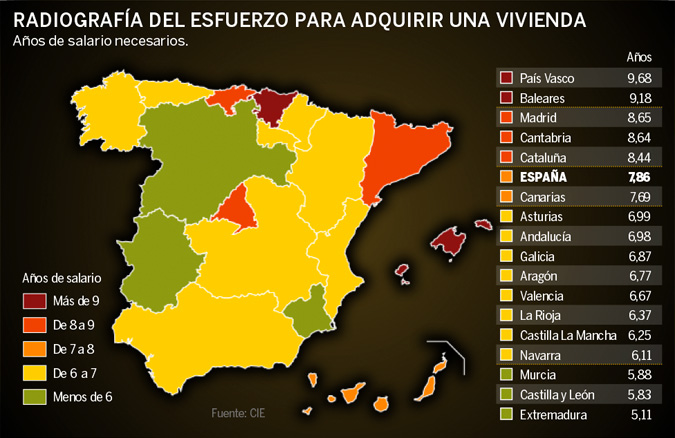Accoring to
Expansión.com, in Spain dominates the culture of buying a property instead of renting. However, the effort that needs to be done to materialize this desire is very different from one community to another. The Basques are the ones who have to work the hardest and in Extremadura, the least.
On average, the annual salary of nearly eight years of a working life is required to purchase a home in Spain. This is the sacrifice you have to do in Spain if you want to acquire a property. So says a study published by the Foundation of Savings Banks (
Funcas) in the latest issue of the Journal of Economic Information.

The authors find that the lower prices of housing, a drop of -27% according to Tinsa, and 19%, according to the Ministry of Development, have reduced the number of salaries required to purchase a home. Thus, while in 2005 the annual salaries needed were 10.1 to buy property, in 2011 is reduced to a 7.9 average in Spain. Now you have to work two years less to own.
The data also indicates that housing in Spain is walking at two different speeds. Analyzing the data by region, five of them are above the national average in terms of effort to get to have a property ownership.
Who are they?
Basque Country (9.7 salaries), Baleares (9.2 salaries), Madrid (8.7 salaries), Cantabria (8.6 wages) and Catalonia (8.44 wages). To receive a salary and try to buy a home in any of these communities requires more effort than average.
Where does the opposite occur?
In Castilla-La Mancha 6.3 annual salaries are required, in Navarre, 6.1, in Murcia, 5.9, in Castilla y León, 5.8, and Extremadu-ra, 5.1. The data analysis shows that the effort you have to do the in the Basque country is double that should do Extremadura.
In the constitution of this indicator, which is one of the main elements that have shaped financial savings and autonomic debt, wages play a key role, which have registered a growth of 20.1% between 2005 and 2011, according to the data collected by Funcas.
However, in recent years we have seen a slowdown in salary growth: the variation between 2009 and 2011 is 1.1%, as a result of the economic crisis and moderation that are suffering the salaries.
Regardless of the worst of the crisis, Murcia has been the region where wages have experienced the most growth since 2009, 3.2%, followed by Galicia (3%), Basque Country (2%), Extremadura (2%), Navarra (1.5%), Catalonia (1.5%), Asturias (1.2%) and Valencia (1.1%). Although three communities have seen a drop in compensation per employee: Canarias (-0.8%), Andalusia (-0.3%) and Castilla y León (-0.1%).


